Key takeaways:
- Ethical peer review is essential for maintaining quality and credibility in scholarly publishing, emphasizing transparency, objectivity, and constructive feedback.
- Challenges include biases from reviewers, high workloads leading to rushed assessments, and anonymity potentially shielding unethical behavior.
- Best practices involve clear communication, training for reviewers, and setting clear expectations for timelines to enhance the peer review process.
- The future of ethical peer review may focus on transparency, technological advancements, and a greater emphasis on ethical considerations in research practices.
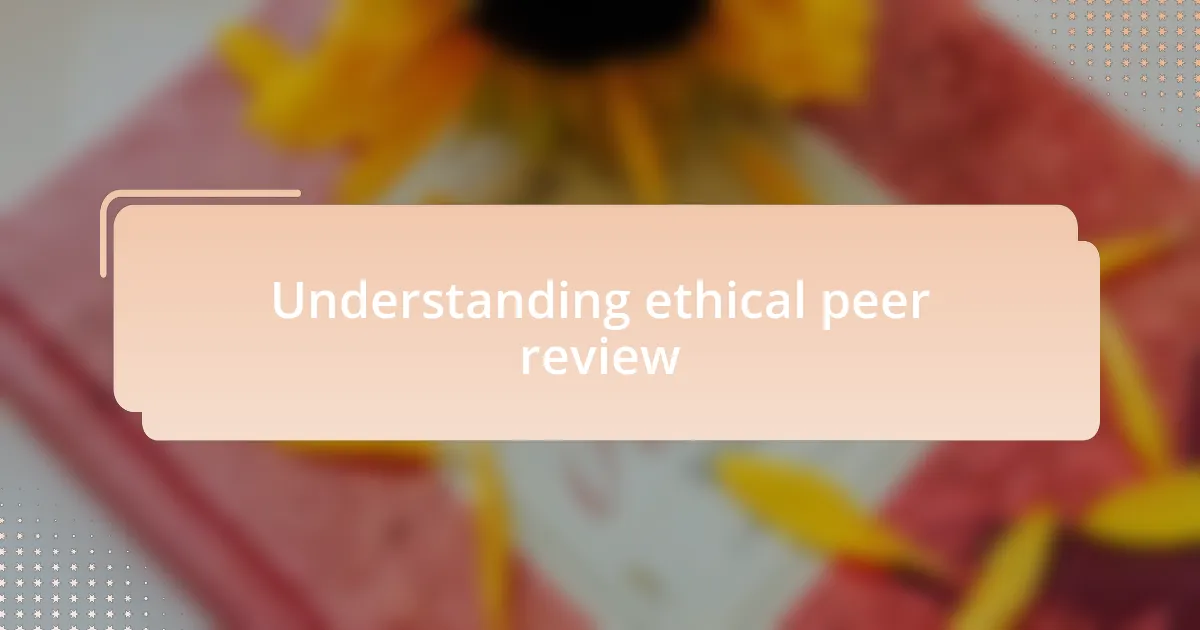
Understanding ethical peer review
Ethical peer review is the backbone of scholarly publishing. I remember my first experience submitting a paper—seeing it pass through the hands of experts, I thought, “Will they truly engage with my work or skim through it?” This anxiety highlights the importance of integrity in the review process. Every reviewer should respect the intellectual effort of the authors, providing constructive feedback rather than just criticism.
In my view, ethical peer review hinges on transparency and fairness. The reviewers must remain objective, putting aside personal biases or conflicts of interest, which isn’t always easy. It brings to mind a time when a colleague faced harsh criticism from a reviewer who clearly had an agenda. That experience reinforced my belief that ethics in this process can shape not only individual careers but the trajectory of entire fields of study.
Moreover, ethical considerations extend to confidentiality. I often reflect on how sensitive the information surrounding unpublished research is. The thought of a manuscript being mishandled can be daunting, and it makes me wonder: how can we instill a culture of trust among scholars? It’s essential that we cultivate an environment where authors can feel secure sharing their work, knowing that their contributions will be handled with care and respect.
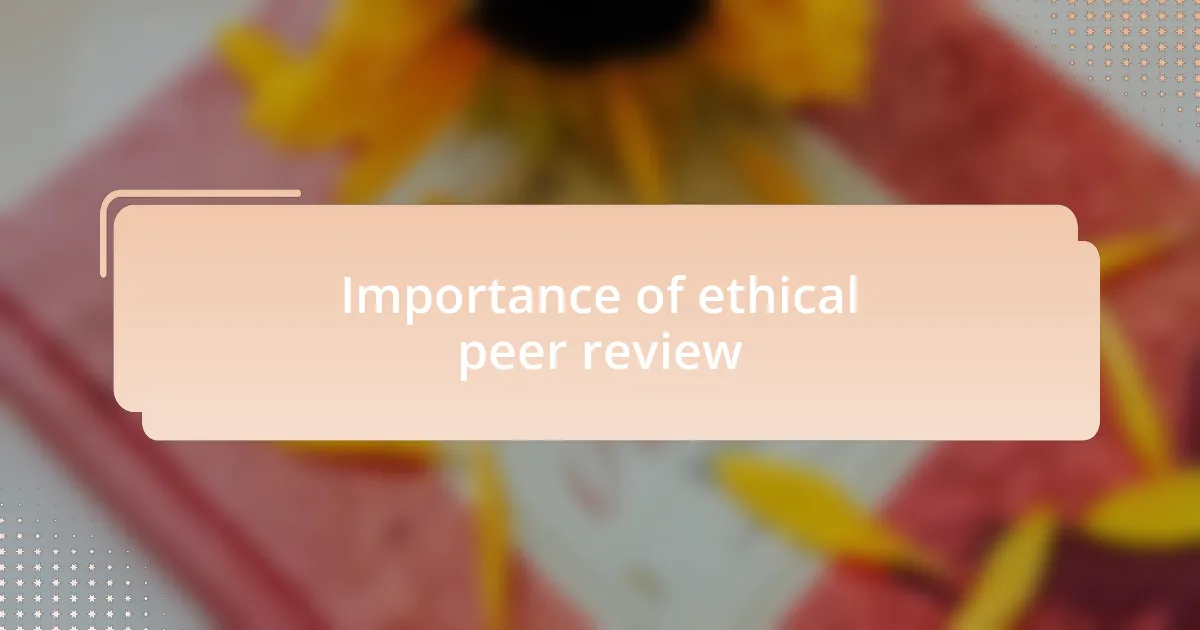
Importance of ethical peer review
The role of ethical peer review cannot be overstated; it ensures that the academic community maintains a high standard of quality and credibility. I recall a time when a colleague’s groundbreaking research was unjustly dismissed due to unhelpful review feedback. It made me realize how crucial it is for reviewers to not only assess the work rigorously but also to foster a supportive environment that encourages innovation.
When I think about the implications of unethical peer review, I can’t help but feel frustrated. Imagine if groundbreaking discoveries were overlooked simply because a reviewer had a narrow viewpoint. This is why it’s imperative for the process to uphold standards of impartiality; it directly affects the advancement of knowledge in our fields.
The trust between authors and reviewers is pivotal. I once received feedback that challenged my assumptions but was grounded in respect and understanding. This experience underscored for me that ethical peer review isn’t just about critique; it’s also about mentorship and guidance. Isn’t it our duty to nurture the next generation of scholars and ideas?
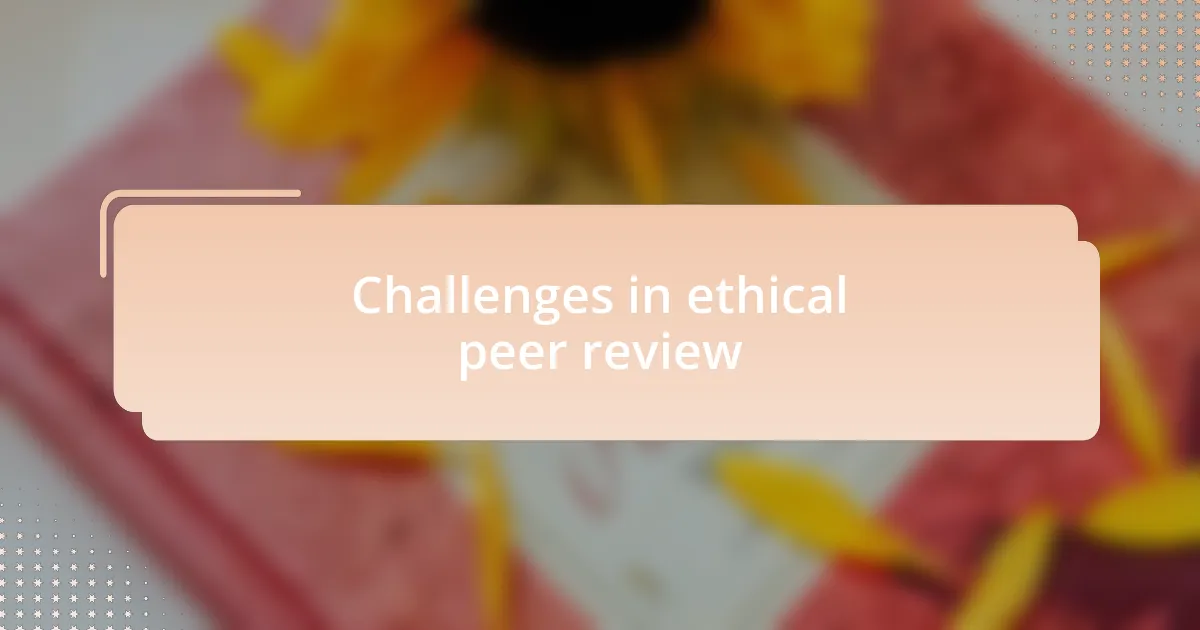
Challenges in ethical peer review
It’s not uncommon to encounter biases during the peer review process, and that’s a significant challenge to ethical practices. I remember a situation where my submission was reviewed by someone who had a strong preference for a competing methodology. Their personal biases seeped into the feedback, which was disheartening. How can we expect fair evaluations when personal opinions cloud professional judgments?
Another hurdle I’ve noticed is the sheer workload of reviewers, which often leads to rushed assessments. Once, a peer reviewed my article but seemed to miss critical points entirely due to time constraints. This experience made me wonder: how can we maintain rigorous standards if our reviewers are constantly pressed for time and resources?
Furthermore, the anonymity of the review process can sometimes shield unethical behavior. I’ve seen instances where reviewers have provided harsh critiques without accountability, leading to discouragement for authors. Doesn’t it make you question whether anonymity should have limits in order to preserve the integrity of feedback?
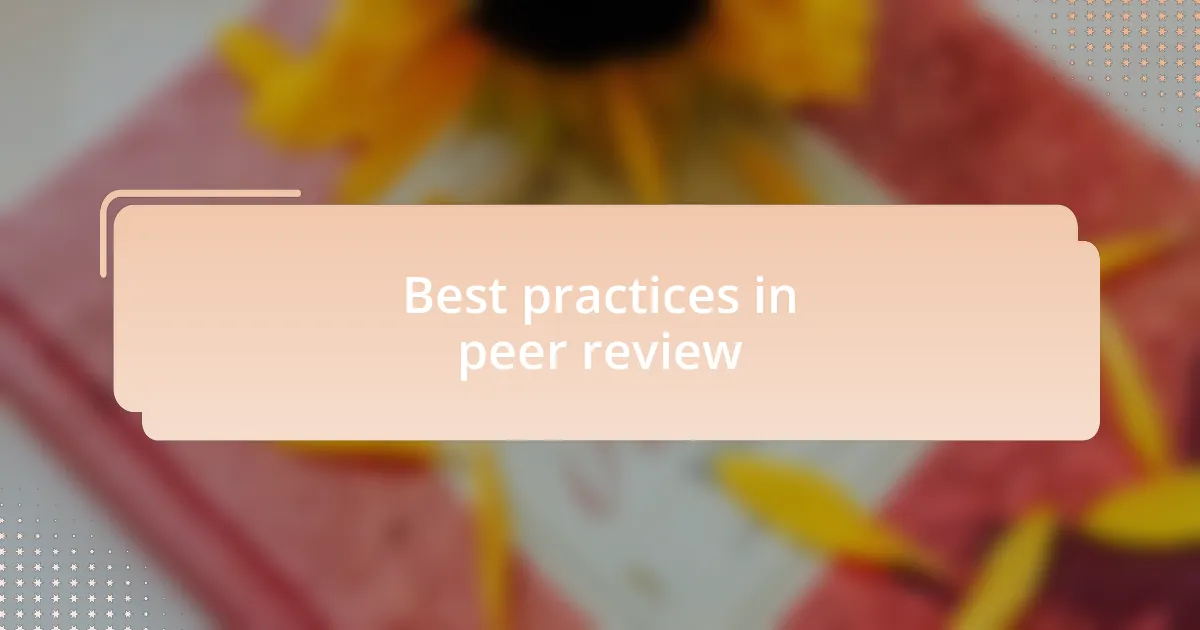
Best practices in peer review
One best practice in peer review that I hold dear is ensuring clear communication between authors and reviewers. I recall a time when a reviewer reached out with specific questions about my methodology, rather than simply criticizing it. This dialogue not only helped clarify my intentions but also reinforced the collaborative nature of academic work. When reviewers engage in constructive conversations, it enhances the quality of the feedback and fosters a supportive environment for authors.
Another vital aspect is the importance of training reviewers. I’ve seen the difference it makes when a reviewer understands what to look for in a manuscript, beyond surface-level elements. In one instance, I participated in a workshop focused on ethical peer review; the insights I gained improved my own reviews significantly. If we want to ensure that the peer review process upholds high standards, investing in reviewer training is essential.
Lastly, I believe that setting clear expectations for timelines is crucial. In one project, I faced delays because the reviewers were overwhelmed, and it felt frustrating as an author. When deadlines are respected, it allows everyone involved to maintain their focus and commitment. How can we foster a culture of accountability if we don’t prioritize timely reviews? Being patient yet proactive about timelines could enhance our collective efforts in academic publishing.
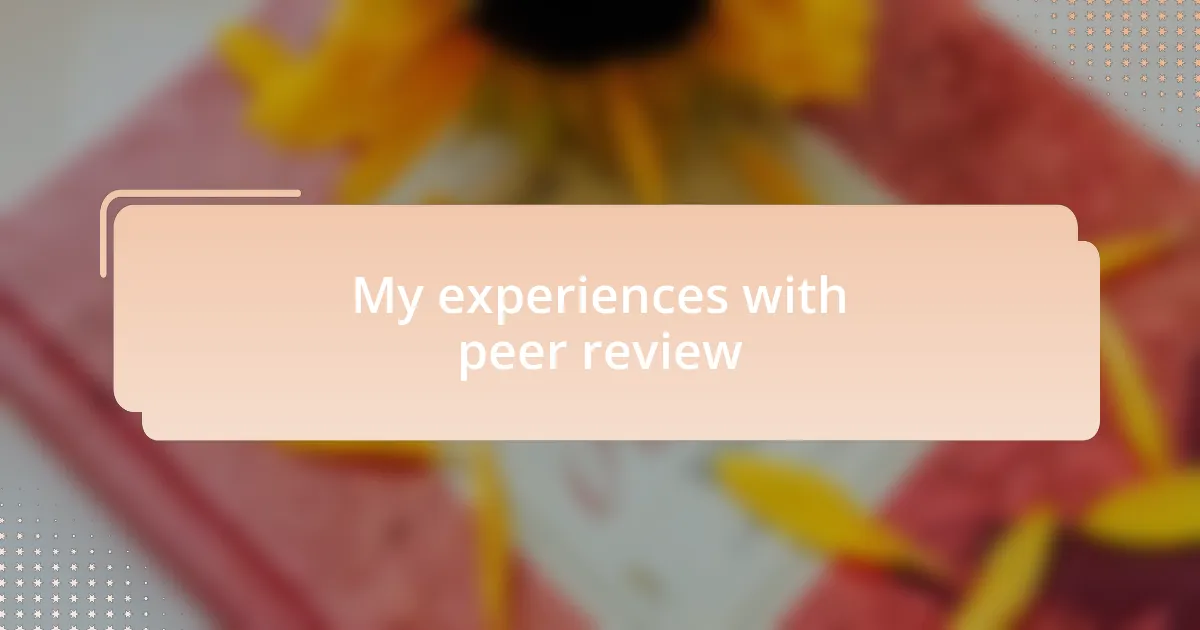
My experiences with peer review
Navigating the peer review process has genuinely shaped my understanding of academic publishing. I vividly remember submitting a paper and receiving feedback that felt more like a personal attack than a critique of my work. It left me feeling disheartened for a moment, but I took that experience to heart. It taught me the importance of empathy in peer reviews, reminding me to approach my own evaluations with sensitivity and supportiveness.
On another occasion, I served as a reviewer for a paper that resonated deeply with my own research interests. As I crafted my feedback, I felt a genuine responsibility to help the authors enhance their work. I poured effort into my comments, focusing on areas that could spark their creativity. This experience reinforced my belief that peer review is not just a task but an opportunity to mentor fellow researchers. It raises the question: how can we shift our mindset from seeing peer review as a chore to embracing it as a valuable collaboration?
When I reflect on my experiences with peer review, the emotions vary—excitement, frustration, and even gratitude. There have been times I met authors whose papers I reviewed, and seeing their faces light up when they discussed their work was incredibly rewarding. It made me realize that behind every manuscript are real people who are passionate about sharing their knowledge. This connection often makes me wonder: what if we could foster more relationships like these throughout the academic community?
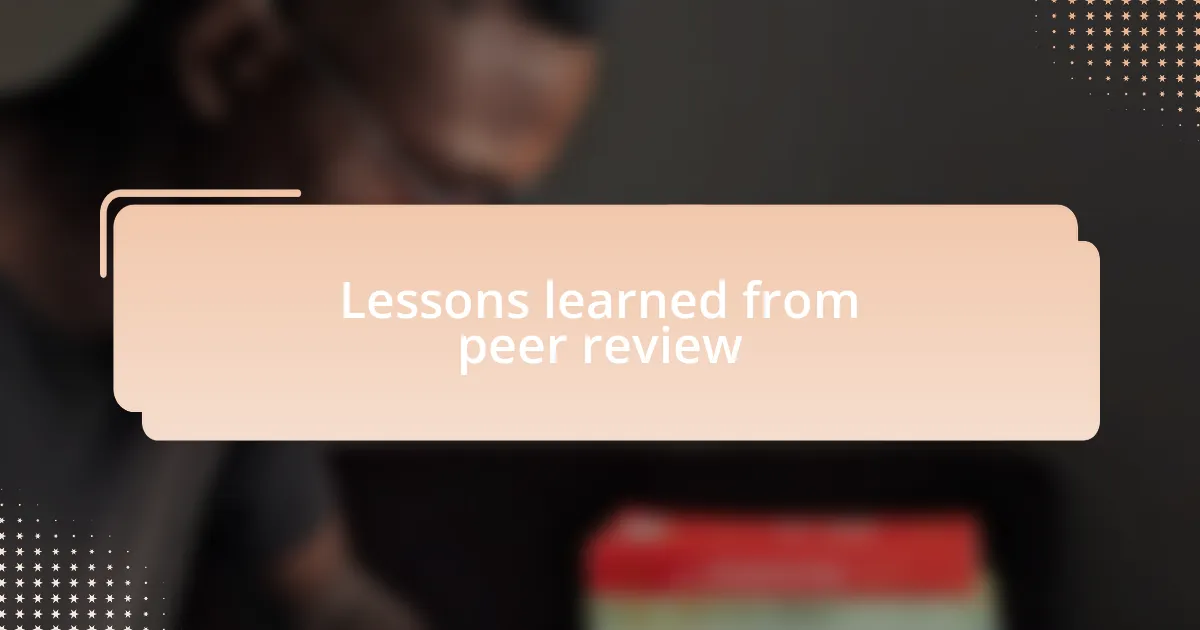
Lessons learned from peer review
Engaging in peer review has taught me the value of constructive feedback, something I learned the hard way. I once received a critique that highlighted not just flaws but also potential directions for improvement. It shifted my perspective; instead of seeing criticism as a setback, I began to appreciate it as a guiding light. How often do we overlook the opportunity to grow because we fear negative comments?
Another lesson that stands out involves the importance of clarity in communication. During a review, I noted that the authors had a brilliant concept but struggled to convey it effectively. I found myself wishing I could sit down with them to brainstorm ways to present their ideas. This experience reminded me: as reviewers, we have a responsibility to offer insights that not only critique but also clarify and inspire. Have you ever encountered work that was difficult to understand, even if the underlying idea was brilliant?
Finally, I’ve come to understand peer review as a dynamic dialogue rather than a one-way street. I recall a time when one of my suggestions prompted the authors to rethink an entire section of their paper. The excitement in their response was palpable, making me realize that peer review can catalyze innovative thinking. What if we approached each review with the intention of fostering a lively exchange of ideas, rather than merely pointing out mistakes? That shift in mindset could elevate the entire academic discourse.
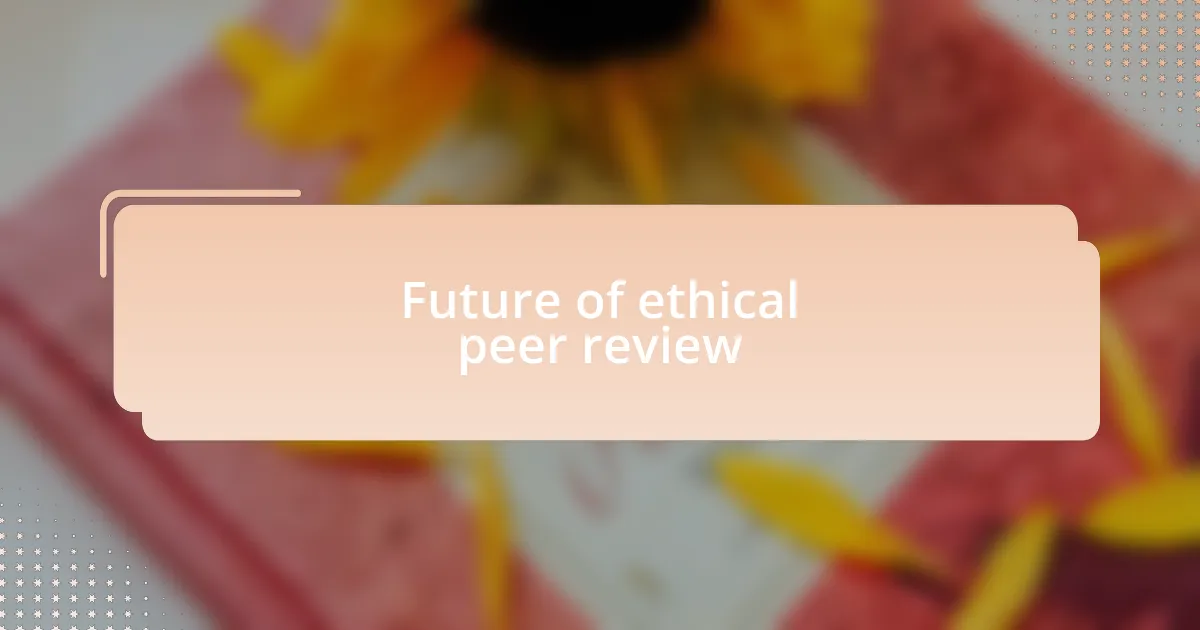
Future of ethical peer review
Looking ahead, I see ethical peer review evolving in response to technological advancements and changing academic expectations. For instance, the incorporation of artificial intelligence could streamline the review process by flagging potential biases or highlighting blind spots in submissions. It raises an important question: how do we ensure that human judgment remains at the core of evaluation in an increasingly automated landscape?
As someone who’s navigated various peer review models, I’ve found that transparency will play a pivotal role in shaping its future. Imagine a system where the identities of both reviewers and authors are known, fostering accountability and potentially reducing biases. Have you ever wondered how such openness could enhance trust within the academic community? I believe it could turn peer review into a collaborative effort rather than a concealed critique.
Moreover, I anticipate an increasing emphasis on ethical considerations in research and review practices. Reflecting on my own experiences, I’ve noticed that ethical breaches can have devastating effects on academic integrity. Could it be that the future of peer review will involve not just evaluating the quality of research but also engaging in discussions around the ethical implications of the work itself? It’s a thought-provoking shift that could redefine the standards we uphold in academic publishing.